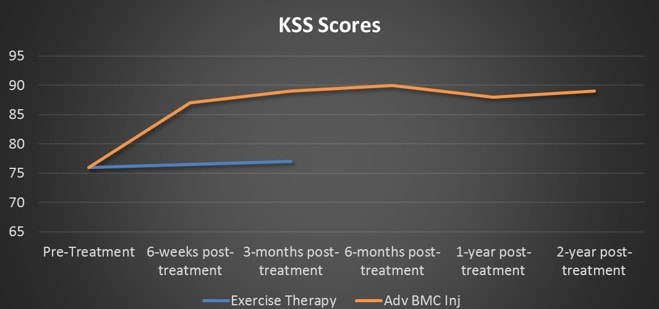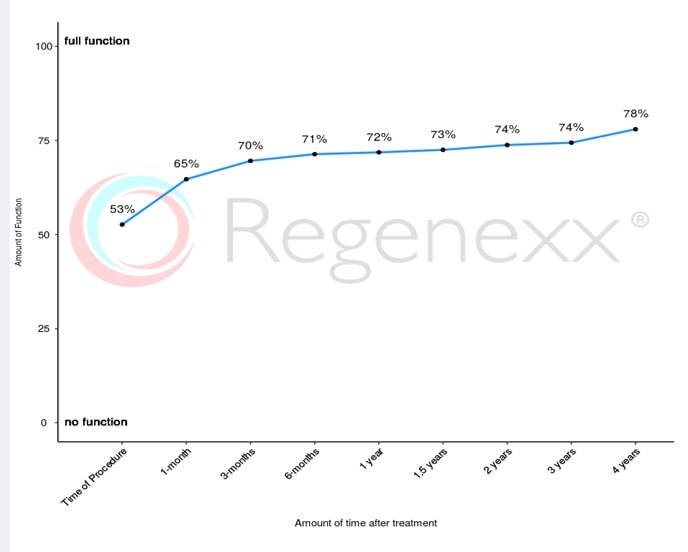How Long Does Stem Cell Therapy Last for Knees?
One of the biggest questions I get from patients who have knee arthritis and want to avoid knee replacement is how long does stem cell therapy last for knees? Interestingly, we’re the only clinic system on earth that can answer that question as we began offering our patients stem cell therapy for knee arthritis in 2005. Let’s dig in.
What Can Be Treated with Stem Cell Therapy for Knees?
There are many different types of problems in knees where stem cells are used. These include:
- Knee arthritis
- Knee tendon tears and tendinopathies (patellar, pes, hamstring, quadriceps, and political tendons)
- Knee ligament injuries (ACL, MCL, LCL, and PCL)
What are the Different Stem Cell Types that are Used?
There are a few options on which research exists and some options where no or very little research exists (4). In order to answer the question, “How long does stem cell therapy last for knees?”, we need long-term research on patients that have been followed for many years. We can break down what we know on each stem cell type being offered:
More Research that Shows this Approach Works in Patients with Knee Problems
- Bone marrow concentrate – this is when the doctor takes your bone marrow aspirate and centrifuges it to concentrate the stem cell fraction. This is often called BMC or BMAC (Bone Marrow Aspirate Concentrate). We are reviewing data here for the Regenexx-SD procedure with is high-dose bone marrow concentrate.
- Fat – this isn’t really a stem cell procedure because it’s not legal to separate the stem cells from the fat. However, the stem cells may still exert effects to help heal cartilage. A commonly used procedure here is called Lipogems.
Less Research:
- Amniotic or umbilical cord cells – First, these products are derived from live births and extensive research by third parties and universities has shown that these products have no living stem cells (1-3). While this may come as a surprise as someone told you that this was a type of stem cell procedure that had millions of young cells, regrettably, this was a sales pitch without much reality. In addition, there is no or very little research in real patients that shows either will be effective at helping your knees. This may also come as a surprise as someone told you that there was extensive research on this type of therapy. Regrettably, almost all of that research uses different cells than those used by clinics and it’s almost all in animals and not humans.
- Exosomes – These are tiny packets of cell to cell communications that have just begun to be used to treat knee arthritis. Again, there is very little research in real patients that shows that exosomes will be effective at helping your knees.
If you want to learn more about these topics, read my mini-book on how to pick a reputable stem cell clinic for your knees:
How Long Does Stem Cell Therapy Last for Knees?
Right now, only the research on bone marrow stem cells is robust enough to reliably answer the question of how long does stem cell therapy last for knees. Fat based knee treatments will begin to get there in the next few years. Amniotic/umbilical cord products and exosomes have a very long way to go to answer this question. Let’s dig into the data to answer this question for bone marrow since that’s the only data that exists.
To keep this simple, we’ll focus on the outcomes for patients with knee arthritis. Below is a graph from our randomized controlled trial (Regenexx procedure) on the use of bone marrow concentrate (a same day stem cell procedure) to treat knee arthritis patients (5). This takes patients to two years and compares that outcome versus physical therapy (which only lasted 3-months). A higher number here represents better function on this Knee Society Score metric. This KSS score looks at things like the range of motion of the knee and the ability to walk and climb stairs:

First, in looking at that published data, 69% of the patients had achieved success with their knees by two years out. Hence, you can clearly see that in most patients, the positive effect of much-improved function lasts for at least two years, which is all this particular study covered.
We can also look at registry results for Regenexx. This is when patients who are routinely treated for knee arthritis get sent questionnaires to fill out at set time points. You can see here below that these patients do well for four years, as higher is better in this graph. In reviewing this data farther out (not shown), patients that respond can get up to 5-7 years of relief from a single treatment.

In summary, the type of long-term data that can answer the question “how long does stem cell therapy last for knees” only exists for the Regenexx bone marrow based procedure. No one else has published or posted on-line data that would allow us to answer that question. The answer is 5-7 years in about two-thirds of the patients.
The upshot? Answering the question of how long does stem cell therapy last for knees takes some research. However, regrettably, for most of what’s being offered as “stem cell therapy,” there isn’t much published data that allows us to really answer this question. However, that data is available for the Regenexx procedure.
____________________________________________
References:
(1) Dustin R. Berger, Nicolette F. Lyons, and Neven J. Steinmetz. In Vitro Evaluation of Injectable, Placental Tissue-Derived Products for Interventional Orthopedics. Interventional Orthopedics Foundation Annual Meeting. Denver, 2015. https://interventionalorthopedics.org/wp-content/uploads/2017/08/AmnioProducts-Poster.pdf
(2) Liliya Becktell, Andrea Matuska, PhD, Stephanie Hon, DVM, Michelle L. Delco, DVM, PhD, Brian J. Cole, MD, Lisa A. Fortier, DVM, PhD. Proteomic analysis and cell viability of nine amnion-derived biologics. Orthopedic Research Society Annual Meeting, New Orleans, 2018. https://app.box.com/s/vcx7uw17gupg9ki06i57lno1tbjmzwaf
(3) Panero, A. J., Hirahara, A. M., Andersen, W. J., Rothenberg, J., & Fierro, F. (2019). Are Amniotic Fluid Products Stem Cell Therapies? A Study of Amniotic Fluid Preparations for Mesenchymal Stem Cells With Bone Marrow Comparison. The American Journal of Sports Medicine, 47(5), 1230–1235. https://doi.org/10.1177/0363546519829034
(4) Lopa S, Colombini A, Moretti M, de Girolamo L. Injective mesenchymal stem cell-based treatments for knee osteoarthritis: from mechanisms of action to current clinical evidences. Knee Surg Sports Traumatol Arthrosc. 2019;27(6):2003–2020. doi:10.1007/s00167-018-5118-9
(5) Centeno C, Sheinkop M, Dodson E, et al. A specific protocol of autologous bone marrow concentrate and platelet products versus exercise therapy for symptomatic knee osteoarthritis: a randomized controlled trial with 2 year follow-up. J Transl Med. 2018;16(1):355. Published 2018 Dec 13. doi:10.1186/s12967-018-1736-8
If you have questions or comments about this blog post, please email us at [email protected]
NOTE: This blog post provides general information to help the reader better understand regenerative medicine, musculoskeletal health, and related subjects. All content provided in this blog, website, or any linked materials, including text, graphics, images, patient profiles, outcomes, and information, are not intended and should not be considered or used as a substitute for medical advice, diagnosis, or treatment. Please always consult with a professional and certified healthcare provider to discuss if a treatment is right for you.
